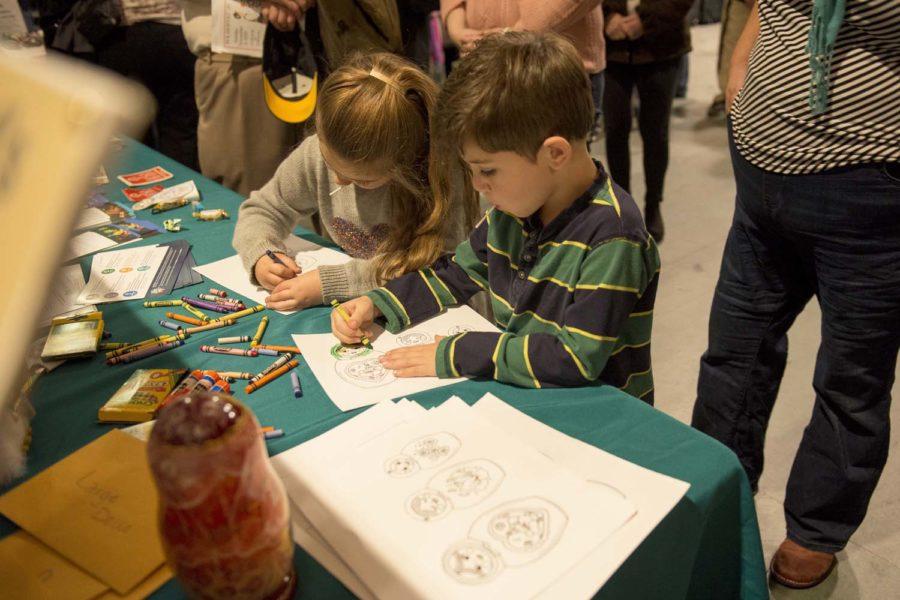Polish festival kicks off Christmas celebrations
The Polish Festival — hosted by the Polish Nationality Room and other Polish community organizations — took place last Sunday.
Children color in images of nesting dolls at Sunday’s Polish Festival in the Cathedral of Learning.
November 12, 2019
The smell of sauerkraut and fried dough filled the air of the first floor of the Cathedral of Learning, kicking off Polish Christmas celebrations.
The Polish Festival — hosted by the Polish Nationality Room and other Polish community organizations — took place last Sunday. The event included polka music, a choir performance, polka dancing and a variety of food and gift vendors, bringing students and community members together to share their love of all things Polish and to kick off their holiday season.
The festival boasted several gift vendors selling items ranging from small nesting dolls to T-shirts boasting Polish pride with “Polska” written across them — the Polish word for Poland. Before festival goers could get to shopping and feasting, they funneled past several women asking for donations to help keep the festival free for years to come.
Among the ladies was Judy O’Connor, a 75-year-old resident of Squirrel Hill and the wife of former Mayor Bob O’Connor. Judy O’Connor said she loves the festival and is glad for the time she spends at the event each season.
“This is the 35th year, I think,” she said. “I’ve been doing this maybe for six years now and the people are just wonderful.”
Considering the festival was held on the same day as a Steelers game, she was impressed by the turnout. She assumed most of the community members would be at the game and said she was pleased so many people decided to come out this year.
“Today there’s a Steelers game, and I didn’t think it would be this busy,” she said. “But it’s amazing the people out here, and a lot of students are in here too and I think that’s wonderful.”
The event offered plenty of traditional food options, including several booths of fresh-baked bread. One in particular had darkly hued paczki. This traditional holiday treat is made of dough with extra butter and egg yolks, fried and stuffed with a flavored filling.
Gene Love, also known as The Fudge Guy, had a stand at the event, selling mainly fudge and other chocolates. Fifteen different kinds of fudge were on display, from peanut butter to “space dust” — basic fudge dyed blue and covered in sprinkles. Love said he follows a traditional recipe depending on the flavor he’s making and made 600 pounds for this event.
“This is my fifth year here, and everybody seems to receive me pretty well,” he said. “So, I’ll keep coming back as long as they’ll have me.”
A portion of the festival included a choir and dancing by local Polish groups. The choir sang Vivaldi’s “Domine Deus,” whose lyrics translate to “praises of God.” The choir and dance groups had their own special costumes that highlighted the color red — prominent in Polish culture as a representation of struggles on the way to freedom for the Polish flag. Ania Becker, anthropology and Slavic studies double major, explained the meaning behind the peculiar design of the dance costumes.
“Folk costumes in Poland are a really big part of Polish culture and each region has a specific costume that differs from other regions,” she said. “Especially during communism it became a big thing — folk singing, folk dancing became a big part of the Polish identity in Poland.”
Polish dances even have a few parallels to American traditions. Becker said children are taught how to dance from a young age, and just as many American teens celebrate prom each spring, Polish dancers will learn the polonaise.
“Children join dance clubs when they’re little and they learn Polish dances,” Becker said. “The Polish version of a prom would be you would dance the polonaise, which is like a waltz kind of thing.”
According to Becker, a large part of recent Polish history has been defined by their ability to stay true to their roots. For a large part of the past century, Poland did not have a fully independent country, so continuing to practice Polish traditions of song and dance kept the people and the culture together.
“A lot of folk aspects, like Polish cuisine, Polish literature, all of those things,” Becker said. “They really emphasize the importance of what makes them Polish, and folk costumes and jewelry and dancing and singing is part of that.”
As a native of Poland, Becker said she feels closely tied with the country. She said she enjoys this festival in particular because it can bring people like her, from Poland, and the people who have Polish ancestors together to celebrate.
“I have a very direct tie to Poland but a lot of people who have lived here for a while, they’re like third or fourth generation, they don’t speak Polish but they still think of themselves Polish and this festival kind of brings them in and let’s them experience Polish culture,” she said. “It gives them a taste of who they are.”








